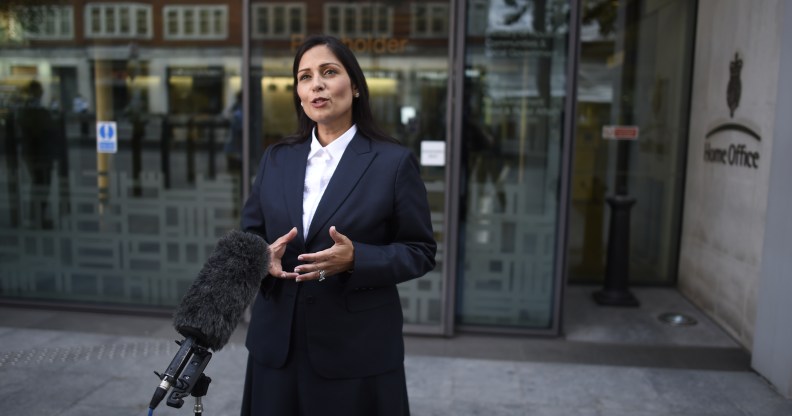Priti Patel, who voted against gay marriage and backed hostile environment, becomes home secretary

Newly appointed Secretary of State for the Home Department, Priti Patel is interviewed outside the Home Office on July 24, 2019 in London, England. (Peter Summers/Getty Images)
Human rights groups have expressed concern at the appointment of Priti Patel, who voted against equal marriage and once advocated to bring back the death penalty, as Boris Johnson’s home secretary.
The MP for Witham, who cites Margaret Thatcher as her political inspiration, takes on the top job where she will oversee immigration, national security, terrorism and the UK’s borders.
Her assignment to the role comes after the UK’s new prime minister presided over the biggest cabinet clear out without a change in party in modern British political history.
Patel’s hard right voting record on key areas covered by her new role will be disconcerting to many LGBT+ campaigners.
Priti Patel has previously backed stricter immigration rules
The 47-year-old Vote Leave campaigner, whose Gujarati Indian parents moved to the UK in the 1960s, previously backed Theresa May’s hostile environment policies between 2014 and 2016.
She has also voted for a stricter asylum system, heightened enforcement of immigration rules, and against a ban on detaining pregnant women in detention centres.

The UK’s new prime minister Boris Johnson delivers his first speech as leader of the Conservative Party on Wednesday. (AFP/Getty Images)
Clare Collier, advocacy director at the human rights group Liberty, told the Guardian: “Priti Patel is a politician with a consistent record of voting against basic human rights protections. For her to be put in charge of the Home Office is extremely concerning.
“The new home secretary needs urgently to put human rights at the heart of Home Office policymaking and reverse the damage caused by Theresa May’s most toxic legacy—the hostile environment.”
As well as Patel, Johnson has appointed several other conservatives who voted against equal marriage in 2013 to cabinet roles, including Gavin Williamson as education secretary and Jacob Rees-Mogg as leader of the House of Commons.
New home secretary Priti Patel has previously supported the re-introduction of the death penalty
While she has said little publicly on LGBT+ rights, Patel, who has been an MP since 2010, voted against the introduction of same-sex marriage in England and Wales in 2013.
She abstained from voting earlier this month on a bill to extend equal marriage to Northern Ireland, which was subsequently passed.
The new home secretary needs urgently to put human rights at the heart of Home Office
In the past she has been a vocal supporter of the death penalty, telling the BBC’s Question Time in 2011 that such a measure would “deter crime.”
However, in 2016, she backtracked on these views.
Her appointment comes as a surprise to many after she was forced to resign from her former post as international development secretary two years ago when it was revealed that she had held a string of secret, unofficial meetings with Israeli ministers.
Following the announcement of her new role, Patel posted on Twitter: “I am deeply honoured to be appointed as Home Secretary by our new Prime Minister @borisjohnson.
“Looking forward to working @ukhomeoffice to prepare our Country for leaving the EU, leading on matters of national security & public safety & keeping our borders secure.”

